1491 1607 - Study guides, Class notes & Summaries
Looking for the best study guides, study notes and summaries about 1491 1607? On this page you'll find 17 study documents about 1491 1607.
All 17 results
Sort by

-
APUSH MUST KNOWS Study Guide with Complete Solutions
- Exam (elaborations) • 22 pages • 2023
- Available in package deal
-
- $16.49
- + learn more
maize - Answer Period 1 (1491-1607] CORN. Staple crop that formed the economic foundation of Indian civilizations. columbian exchange - Answer Period 1 (1491-1607] An exchange between the Old World, New World, and Africa. In this exchange the Old World gave the New World food, animals, and diseases. Africa gave the New World slaves. Lastly, the New World gave the Old World gold, silver, raw materials, and syphilis. encomienda system - Answer Period 1 (1491-1607] in the West Indies...
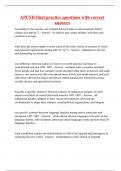
-
APUSH final practice questions with correct answers
- Exam (elaborations) • 43 pages • 2023
- Available in package deal
-
- $16.49
- + learn more
answers According to the excerpt, one contrast between natives and europeans before contact was that (p 7) - Answer no natives had certain military tech that were common in europe what does the source imply was the cause of the wide variety of systems of social and political organization among natives? (p 7) - Answer adaptation to diverse and demanding environments one difference between cultures of natives in north america and those in central/south america 1491-1607 - Answer north...
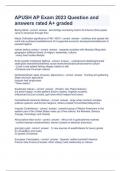
-
APUSH AP Exam 2023 Question and answers rated A+ graded
- Exam (elaborations) • 35 pages • 2023
- Available in package deal
-
- $16.99
- + learn more
APUSH AP Exam 2023 Question and answers rated A+ graded Bering Strait - correct answer land bridge connecting Asia to N America (first people came to Americas through this) Maize Cultivation significance (1491-1607) - correct answer nutritious and spread into north into southwest establishment of it supported economic development/settlement of people/irrigation natives before contact - correct answer separate societies with lifestyles fitting their geography (different forms of...
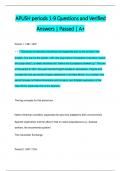
-
APUSH periods 1-9 Questions and Verified Answers | Passed | A+
- Exam (elaborations) • 7 pages • 2024
- Available in package deal
-
- $10.09
- + learn more
Period 1: : This period is basically everything that happened prior to the arrival of the English. The start of the period, 1491 (the year before Christopher Columbus "sailed the ocean blue"), is really shorthand for "before the Europeans showed up." The end of the period is 1607, the year that the English landed in Jamestown, Virginia and founded the first permanent English settlement in the New World. In a nutshell, this period focuses on Native Americans and on early, non-Engl...
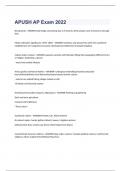
-
APUSH AP Exam 2022
- Exam (elaborations) • 45 pages • 2023
-
- $10.99
- + learn more
APUSH AP Exam 2022 Bering Strait - ANSWER-land bridge connecting Asia to N America (first people came to Americas through this) Maize Cultivation significance (1491-1607) - ANSWER-nutritious and spread into north into southwest establishment of it supported economic development/settlement of people/irrigation natives before contact - ANSWER-separate societies with lifestyles fitting their geography (different forms of religion, leadership, culture) - many lived mobile lifestyle Arct...
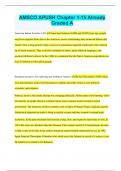
-
AMSCO APUSH Chapter 1-15 Already Graded A
- Exam (elaborations) • 36 pages • 2023
- Available in package deal
-
- $10.99
- + learn more
AMSCO APUSH Chapter 1-15 Already Graded A American Indian Societies 1491 Some time between 10,000 and 40,000 years ago, people may have migrated from Asia to the Americas, across a land bridge that connected Siberia and Alaska. Over a long period of time, successive generations migrated southward to the southern tip of South America. They evolved to hundreds of tribes, spoke different languages, and practiced different cultures. In the 1490s it is estimated that the Native American population wa...

-
AMSCO APUSH Chapter 1-15 Study Guide with Complete Solutions
- Exam (elaborations) • 32 pages • 2024
- Available in package deal
-
- $12.49
- + learn more
AMSCO APUSH Chapter 1-15 Study Guide with Complete Solutions American Indian Societies 1491 - Answer️️ -Some time between 10,000 and 40,000 years ago, people may have migrated from Asia to the Americas, across a land bridge that connected Siberia and Alaska. Over a long period of time, successive generations migrated southward to the southern tip of South America. They evolved to hundreds of tribes, spoke different languages, and practiced different cultures. In the 1490s it is estima...

-
APUSH periods 1-9 Questions and Verified Answers | Passed | A+
- Exam (elaborations) • 7 pages • 2024
- Available in package deal
-
- $9.99
- + learn more
Period 1: : This period is basically everything that happened prior to the arrival of the English. The start of the period, 1491 (the year before Christopher Columbus "sailed the ocean blue"), is really shorthand for "before the Europeans showed up." The end of the period is 1607, the year that the English landed in Jamestown, Virginia and founded the first permanent English settlement in the New World. In a nutshell, this period focuses on Native Americans and on early, non-Engl...
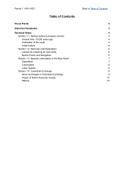
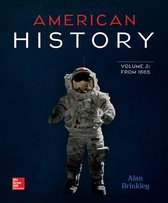
-
US History. Period 1. 1491-1607. American History: Connecting with the Past. AP
- Summary • 10 pages • 2022
-
- $2.99
- 1x sold
- + learn more
Note on "Period 1. 1491-1607" of US history, including an overview of all contents, detailed note and key vocab Applicable for introductory college courses on US history Key test focus for getting a 5 on AP US history. Best for AP test preparation Based on the textbook American History: Connecting with the Past, ISBN: 6749.ISBN: 6749. by Alan Brinkley
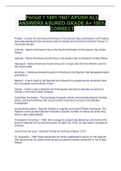
-
Period 1 1491-1607 APUSH ALL ANSWERS ASURED GRADE A+ 100% CORRECT
- Exam (elaborations) • 2 pages • 2022
-
- $10.99
- + learn more
Pueblo - a name for the Native Americans of the present-day southwestern US Pueblos were also apartment like structures make of adobe and mud that formed the "towns" of the pueblo people Chinook - Native Americans living in the Pacific Northwest of the present- day united States. Iroquois - Native Americans found living in the present-day northeastern United States. Algonquin - Native Americans found living over a large area from the Atlantic coast to the Great Lakes. small pox - Infec...

Study stress? For sellers on Stuvia, these are actually golden times. KA-CHING! Earn from your study resources too and start uploading now. Discover all about earning on Stuvia


